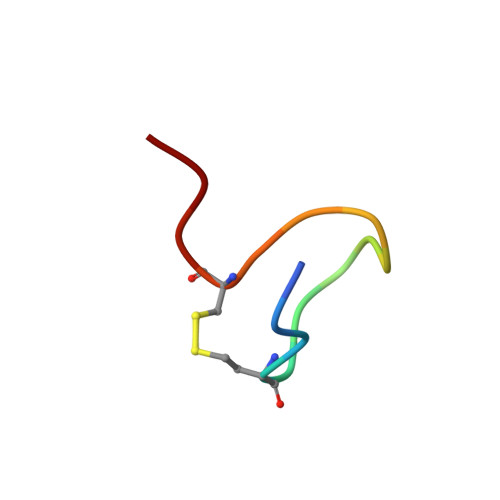The discovery and maturation of peptide biologics targeting the small G-protein Cdc42: A bioblockade for Ras-driven signaling.
Tetley, G.J.N., Murphy, N.P., Bonetto, S., Ivanova-Berndt, G., Revell, J., Mott, H.R., Cooley, R.N., Owen, D.(2020) J Biological Chem 295: 2866-2884
- PubMed: 31959628
- DOI: https://doi.org/10.1074/jbc.RA119.010077
- Primary Citation of Related Structures:
6R28 - PubMed Abstract:
Aberrant Ras signaling drives 30% of cancers, and inhibition of the Rho family small GTPase signaling has been shown to combat Ras-driven cancers. Here, we present the discovery of a 16-mer cyclic peptide that binds to Cdc42 with nanomolar affinity. Affinity maturation of this sequence has produced a panel of derived candidates with increased affinity and modulated specificity for other closely-related small GTPases. The structure of the tightest binding peptide was solved by NMR, and its binding site on Cdc42 was determined. Addition of a cell-penetrating sequence allowed the peptides to access the cell interior and engage with their target(s), modulating signaling pathways. In Ras-driven cancer cell models, the peptides have an inhibitory effect on proliferation and show suppression of both invasion and motility. As such, they represent promising candidates for Rho-family small GTPase inhibitors and therapeutics targeting Ras-driven cancers. Our data add to the growing literature demonstrating that peptides are establishing their place in the biologics arm of drug discovery.
- Department of Biochemistry, University of Cambridge, 80 Tennis Court Rd., Cambridge CB2 1GA, United Kingdom.
Organizational Affiliation:
















